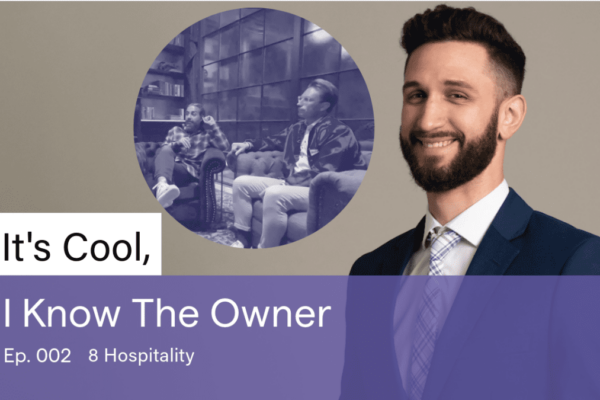TRANSCRIPTION
Hi, guys. Welcome to another episode of ‘It’s Cool. I Know the Owner.’ I’m your host, Zach Schmidt, with The Horton Group. And with me I have the owners of eight hospitality today, Chris Bader and Carmen Rossi. Hello. Thanks for having me. How are we doing today, guys? Thanks for coming out. Thanks for having us. The Horton Group and Zach. Thank you very much. Thank you. Shout out The Horton Group. I love it. They’re already on board.
So what’s going on, guys? How you been? I haven’t seen you much since this past summer. Well, I see you haven’t seen us since you left the industry started on your own. We’re going to. We have a secret. I don’t know if that’s a good or a bad. No. Yeah, we’re doing the interview. Always a little guilt there. You know. That said, we’re doing more projects. I know Chris and I are a little bit diverse in our own talents and focuses and what we’re focusing on. It’s not simply hospitality, limited to hospitality rather. But yeah. Chris. S what are some other things you guys currently have in the works?
We have a well, this is yeah, being filmed in January and this was what I had in the works was a parlay that was supposed to hit with the Dallas Cowboys. Devastating. And as Carmen said, no one in the office is going back in San Francisco and we wish San Francisco the worst and the 49ers the worst. It’s very important to say that if the overall energy of this podcast is perhaps not as enthusiastic, it’s because of yesterday’s devastating….Dallas has lost a lot of money responsive…responsibly. We gamble on the gaming apps responsibly. We responsibly lost two bars yesterday. So 8 hospitality has just been cut in half in the last 24 hours. And ask without. We are very confused as we talk. Yeah we are not One Off hospitality. We were 8 Hospitality now early we’re down to One Hospitality…should championship weekend this weekend go well we’ll be back to Ten Hospitality.
I moonlight as a comedian. It is my passion, just having fun doing videos and stuff like there’s. You’ve been doing that now, ten years. Ten years. I’m right around when we started buying, when we started 8 Hospitality Group, which would be February, would be our ten year anniversary and last year I had a killer year. I made $11,400 in comedy, which I parlayed that into some responsible bets that didn’t work out. We have some good projects coming up. We have some stuff in the West Loop that we haven’t officially announced yet. We have a building on Randolph Row and it’s a little bit a little bit more west than the primary locations, but it’s where everything is going and we’re excited about that company.
A lot of our initial projects and perhaps not surprisingly were in neighborhoods, were more north Bar 63 and Broadway, which was the old Hamilton’s that’s in Rogers Park. Old Loyola Bar. Loyola Bar, Yeah. And then, you know, we had a bunch on Lincoln Avenue and Lincoln Park, and then we got into Old Town. We’ve expanded in River North in the Loop, and we’re both looking at projects outside of the state, down from Georgia, Arizona, New York, Florida, Florida. Yeah. So, yeah, now we’re you know, we’re just looking at a portfolio of locations and imagining some diversity.
So not only like expanding business to other states nationally, like you just mentioned being successful in Chicago. Have you guys ever thought about or considered if you were to live somewhere in the U.S., somewhere else in the U.S., do you think you could thrive somewhere else? What would be some ways that comes to mind? I think West Coast, West Coast. Are you too established in Chicago to leave it at this point or you just like where you’re at now? I think it’s a big period of growth. If you see what’s going on in the city of Chicago and, you know, the largest hospitality groups more than ever the last three or four years, you’re seeing a lot of them have great success in several different states, not necessarily because they’re a franchise or they want to you know, it’s not 30 McDonald’s, but it’s the groups you see here. So I you know, in the Southeast, for example, in Chicago, you could go to a Chicago tavern, like just a tavern style bar and get really good burger and fries and food. And that same food is not made at different other taverns around the country. Like it’s just not as good. So if you take our approach to hospitality, as Carmen says, like it’s kind of like they say you can make in New York, you can make it anywhere. If you make in Chicago, you can make it anywhere.
So it’s kind of the idea of what we’re able to do in Chicago. You don’t see it in on the West Coast. You don’t see it in Los Angeles like they’re at every and this is not a dig at those servers that are working hard because they’re in the entertainment business, but they’re more concerned of where their next audition is, what’s going to happen, if their next video is going to pop, a lot of them. And in Chicago, people are career servers. And we were fortunate of a study where people who do two jobs at once and they really care about the consumer, they really care about the product that comes out and you don’t see that around the country. So we want to apply that, you know, happy pressure to those other cities. And, you know, that’s why we’re thinking about taking some of our concepts to other cities, taking our talents of what we know about the hospitality to other cities and getting the staff to buy in and take a stake in the company. We think there’s a big void in a lot of cities, so we’re looking everywhere. For me to answer the final question of what cities? I think, Carmen, I both have an affection for New York. I think we both enjoy Florida. Those those are for me, those some cities that if we were going to live somewhere part time or go back and forth. But you know. Carmen Well, I don’t want to be infamous in saying this, but I, I love this city. I never imagined leaving. I’ll stay here until they run me out. Casino’s a hot topic in its it’s not a topic where at any point everyone’s going to be on the same page by a long shot. I should just removing all of the removing all of the noise. I think that it I’m hopeful that gaming as an industry will continue to get more attention for business opportunities. I mean, throughout the state if you have a liquor license, most municipal I should say most many municipalities allow you to have gaming terminal operations. So real would be a which would be great for small business. So sorry not to interrupt, but the things you’re talking about now, like in your opinion, do you find that like Illinois in Chicago is kind of behind the curve as far as a lot of industries like marijuana gaming, things that other states and major cities are doing, But we always seem to be the last to get legalize and get funding for and really get going on. I will answer this question by saying I have a little bit of an advantage in that I, I spend a good amount of time following this stuff. Illinois State population is dropping. City of Chicago’s population is increase, in particular major sects. Where we’re losing significantly is the west and south sides that those communities are ravaged and you you’re just seeing people leave in droves that said no and go to other states. Illinois is pretty aggressively progressive when it comes to cannabis. We are both medical and rec. To answer your question, every municipality sort of has home rule. So while it’s legal in the state, every town gets to decide its extent right. And, you know, the city of Chicago doesn’t have lounges yet, but I think you’ll see that maybe within 2023 when it comes to starting to pop up in the suburbs and stuff, you’ll see them in the suburbs for sure, where there’s like consumption lounges and, you know, you can buy your pot brownies and have a cup of coffee and it’s almost like a weed Starbucks or like a cafe. So that is interesting. Or maybe it’s only interesting to people are 1 to 1 or directly intimate with those industries. But will cannabis play a role in food and beverage? Will lounges find a way to revenue, generate like gaming? I think we’ve scratched the surface. Illinois is the third largest gaming state in the country we have reached. I think we’re three months in a row, over $1,000,000,000 a month wager. I think Illinois could be a tattoo market when it comes to sports gaming, that’s an incredible step because we’re not number two in population necessarily. But I think Midwest culture is very sport driven. So can we imagine how gaming coalesces hospitality concerns where it becomes part of the business? These are things that we’re exploring. Same with cannabis. I don’t think there is a proven economic model to show that a lounge within a regulatory scheme works, but I think we’ll progress in time.
A lot of people know who you guys are, especially in hospitality. But to get a little more background on you guys, you started talking about it. That’s a big part of this podcast. Getting to know you guys, where you came from. We went to a we went talked a lot about the president right now and where things are going. So, you know, when I first heard about you guys when I was working at State with Robin Cook, he would mention you guys, you all went away together. So if you could just like brief, brief history, background, how you guys met, where you come from and how it led into what you’re doing now. There is a bar, I’m not going to tell you the year because Khama and I are gen-z. And during that time I went to University of Illinois in Champagne, and I was kind of like a party planner for the bar. And the bar had just hired students on campus. Typically in a bar in Champagne, you would have to work your way up. So you’re a doorman, you’re a barback then you become a head doorman or you become a bartender. Then, you know, you become a manager. The advantage of University Illinois Champagne has always been 19 to enter the bars and to work there as well. So it really helped people, students who needed money. So, you know, I was a college student. I wanted money. So I applied to this bar. And one day I walk in and I don’t know if you guys know American Idol, but there was a guy who looked just like one of the stars from American Idol, and he was wearing a red suit and and that was Carmen. And he was managing the bar at the time. What is the name of this American Idol? Clay Aiken. I was going to say that’s I didn’t want to say it. Yeah. Yeah. These beautiful highlights. It is beautiful for us. It tips and who is this beautiful guy? And I was like, who is this beautiful man? And we got to become fast friends. And Carmen was managing the bar. And what just happened? Robin Cook had the wherewithal to say, listen, we’re going to beat these other bars. The competition. Well, enough of this. If you’re a doorman, then you move up. And if you’re a female shark girl, then you become bartender. He said, let’s just find people who hold executive positions at fraternities and sororities and who are very popular, have, you know, influence on the campus. So Carmen was a manager, and then we started working together in different fraternities, and then we became great friends. As you know, things were okay. So from U of I during u of I wingman productions. When did you guys how that how’d that come about? Well, my sister was dating this guy who this is like, man, I was 18, 19 and she’s dating this guy. And he said, hey, my friend puts himself through college because he throws parties. And then I kind of was interested. I met him. His name was Rob. It’s working in a place called High Tops in Wrigley. And he said, hey, if you bring your friends at the time, you know, I was 19. I was like, okay, what I have to do is like, you invite all your friends and then I’ll give you a dollar per person. I was like, Shit, if I get 100 people, that’s $100. And I thought that was a lot. And then later I realized he was getting $10. Is he getting paid? Yeah, no, no. It’s events companies event companies who are licensing and then and you know, we work with them but yeah yeah so it kind of started from there and then I needed help and Carmen had a huge influence from his high school and people who we knew on campus as well because we were in separate fraternities and he had a side of a brain that I didn’t have. So we kind of combined and started working together and we were working with bars in Chicago, like the one that used to work at State. And we kind of took ideas like St Patrick’s Day and unofficial St Patrick’s Day, which was happening at University Illinois Champagne, which I think still happens, right? Yeah. A version of it happens. And so we kind of applied what we knew and started doing in Chicago.
What got you into 8 Hospitality? We were like, I want to back off a little bit of the events. The promotions get more into us owning and running our own venues. We were working with a group at the time that was we thought was splitting up and at the time Carmen was finishing his last year of law school, was about to sit for the bar and we saw an opportunity where Aberdeen Inn was about to go for sale. A great group of guys and we’re still friends with all of them and we thought Aberdeen was about to go for sale. So inserted kind of Carmen and him and I and we, we met up with our current our other partner and we just all worked together to make it happen so that at that time, our first venture was here. And that’s kind of what started when you’re young, the other side of life is your expenses are reasonable. Both Chris and I took had student loans. I saw some, but you know, we guess Joe Biden is going to get rid of all my student loans…or not because I’m above and age bracket but you should write a letter to the president. I, I think you know so on when it became time we we saved up money. We met through our network. I mean, there is no single there is not a bigger catalyst to our success than our network. I, I do think that luck in timing has so much to do with things, and I can’t stand that proverbial character in a movie that says I don’t believe in luck. You make your own luck blah blah blah. That’s just a silly, silly movie line. There’s kind of a right time and place like things do have to line up. you could make things that happen. It needs to be an amazing idea in a recession. And you don’t capitalize an opportunity. You see it all the time. Yeah, a little bit of luck. But the luck where we would where we would perhaps describe a central ingredient to luck is our network. I mean, we’ve been super fortunate and I guess that could be a testament to character and personality in that, you know, the network has to welcome, be welcoming with open arms, I suppose. But it is it is, you know, part of our internal dream to to wake up every day and imagine working for the day. Your dream job. Yeah, it’s easy to get stuck kind of going down one path. You know, ten years go by and you just get deeper and deeper and, you know, maybe it’s too late to try something different or risk averse, right? You know, it’s not worth the risk or you just don’t know how to pursue that. Yeah, Chris is excellent at engaging, communicating, asking questions, reaching out to industry experts, whatever the industry. And I think that’s a wonderful personality trait to have If you’re starting a business or just following a passion or just exploring an opportunity, as is meeting with industry experts, asking a ton of questions. And I think, you know, if there was a theme to this whole thing is that you’re finding to people where hospitality called managed to find some success in hospitality and real estate development with no background in hospitality, real estate development, you know, active and you’re you’re you’re asking us the story and we’ve attempted to bring you on a journey and in 20-30 minutes. But, you know, the reality is we’re just like we’re just a couple of normal guys who met in college and I’m definitely fed off one another’s, you know, strengths and networks. And now, you know, looking toward the future, I mean, this is a great I imagine, at least for some time until you get national syndication for your podcast working out, this will be more located to Chicago. Yes. Anything you want to leave us with, just about 20 more minutes left. I want to kind of piggyback off of what Carmen has said for anyone out there who wants to be an entrepreneur, you know, partnership stuff about hospitality, he kind of hit it on the head. Like we became good friends. We both had these aspirations to find success and it’s a rollercoaster and it goes up and down and there’s good. And I would say after ten years, if you’re getting worse at something, you probably should stop doing that thing. Time to rebound and gauge, you know, Carmen doesn’t mention he didn’t mention this about himself, but he also has a law firm. He’s also, you know, an attorney, not necessarily a litigator, but, you know, does different types of transactions. And I’ve watched his personal brand and him as an attorney kind of grow every single year. And I think if and he indexes himself well into to other businesses. And now I’ve come along for the ride as well. And I look at other businesses, we love business. It sounds silly like it’s a love business, but we will look at anything like like creating jobs in the City of Chicago, creating jobs in Illinois, building companies, building culture. And we’ve from the success we’ve taken that we’ve had in hospitality, in real estate development, we’re kind of parlaying that into other ventures. We’ve been successful. So I’m excited to see where the next ten years is, who knows?
But if you’re getting worse at something, you really need to stop, maybe go to Chase. TCF bank is hiring, switch up….or we’re looking for bookkeepers or people who sell…..come back…Zach, you have an open offer to start as an assistant assistant for manager. Thank you to Zach. Thank you to everyone. Please buy insurance from Zach. All right. Thank you, guys. Again, Chris Bader, Carmen Rossi, thanks for coming out today, sharing your story. Now, you guys do know the owners. And with that, farewell.



